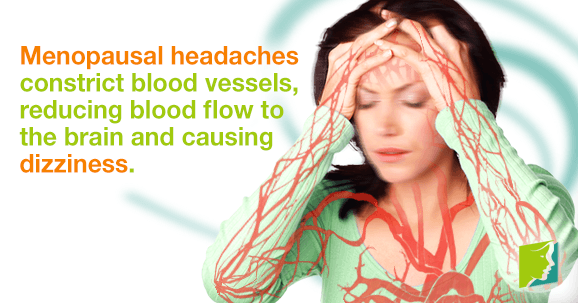Menopause can bring with it a number of uncomfortable symptoms, and headaches are among these. Many of us are familiar with the throbbing pain of a headache, but during menopause, headaches can cause other side effects, such as dizziness. By making a few lifestyle and dietary adjustments, however, you may be able to minimize the occurrence of headaches and eliminate dizziness altogether. Keep reading to find out more about menopausal headaches, dizziness, and the links between them.
Menopause and Headaches
Estrogen and progesterone are sex hormones that help the blood vessels to expand and relax. During perimenopause, the production of sex hormones like estrogen and progesterone decline as the body prepares for menopause. Headaches during menopause have a clear hormonal link, though the mechanism is not clear. It is thought that a drop in these hormones causes the blood vessels in the brain to expand and constrict rapidly. When this causes blockages in the nerve pathway, a headache may occur. Also known as hormone headaches, headaches during menopause tend to be felt in the front of the head and base of the skull, and usually pass within an hour.
Dizziness
Dizziness has two forms; the first is a sensation of lightheadedness or faintness that causes you to feel as though you may pass out. The second is vertigo, which is the medical term for the sensation that you or the things around you are moving, when they are not actually moving. These feelings are disorientating and distressing, and can sometimes cause nausea or vomiting.
Headaches and Dizziness
Dizziness is often caused by decreased blood flow to the brain. When the blood vessels constrict during menopausal headaches, blood flow to the brain may be temporarily reduced and dizziness can occur as a result. Dizziness is also a common side effect of menopausal migraines and - along with nausea, vomiting, and blind spots - can occur before, during, and after the headache itself. Other factors that intensify menopausal headaches, such as dehydration, fatigue, and stress or anxiety - especially in those who often hyperventilate - can also provoke dizziness.
Reducing Headaches and Eliminating Dizziness
Removing the factors that cause both headaches and dizziness will help alleviate both symptoms. Keep a cool, ventilated bedroom and follow a regular sleeping pattern to promote restful sleep and address fatigue. Find ways to relax on a daily basis to help combat the effects of stress and anxiety. Staying hydrated to prevent dehydration-derived dizziness.
Stimulate blood circulation to the brain by gently massaging your head using your fingertips. Using herbal teas, stretching, and regular exercise and help stimulate blood circulation. Other headache-relieving solutions include:
- Regular aerobic exercise
- Deep, controlled breathing during a headache for pain relief
- Taking over the counter pain killers
- Avoiding environmental triggers, like brightly lit or loud settings
- Limiting alcohol consumption
- Cutting monosodium glutamate (MSG) sources, such as reformed meat, Chinese food, and junk food
- A doctor may prescribe a topical estrogen gel or patch that may also help
Though headaches during menopause tend to go away within an hour, it's important to do what you can to alleviate them. Headaches can be detrimental to your own well-being, and also can hinder your professional performance and social life, too. If the headaches persist or occurs with increasing frequency or intensity, it's important to see a doctor to discuss other possible causes and treatment options.
Sources
- Better Health Channel. (2014). Headaches and Hormones. Retrieved June 12, 2014, from http://www.betterhealth.vic.gov.au/bhcv2/bhcarticles.nsf/pages/Headache_and_hormones
- Kang, J. et al. (2013). Study on improving blood flow with Korean red ginseng substances using digital infrared thermal imaging and Doppler sonography: randomized, double blind, placebo-controlled clinical trial with parallel design. Journal of traditional Chinese medicine, 33(1), 39-45. Retrieved from http://www.ncbi.nlm.nih.gov/pubmed/23596810
- Mashayekh, A. et al. (2011). Effects of Ginkgo biloba on cerebral blood flow assessed by quantitative MR perfusion imaging: a pilot study. Neuroradiology, 53(3), 185-191. doi: 10.1007/s00234-010-0790-6
- National Health Service UK. (2013). Dizziness (lightheadedness). Retrieved June 12, 2014, from http://www.nhs.uk/conditions/dizziness/pages/introduction.aspx
- National Health Service UK. (2013). Hormone headaches. Retrieved June 12, 2014, from http://www.nhs.uk/Livewell/headaches/Pages/Hormonalheadaches.aspx
- Office of Women's Health. (2012). Migraine fact sheet. Retrieved June 12, 2014, from http://www.womenshealth.gov/publications/our-publications/fact-sheet/migraine.html




